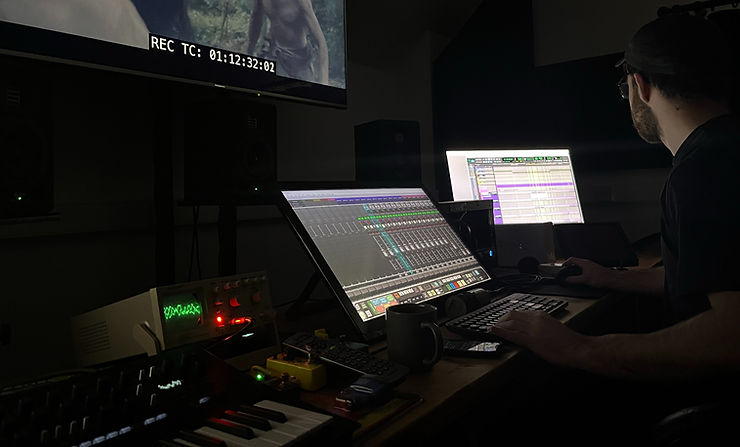


In the realm of audio post-production, the fusion of innovative technology and artistic creativity has always been at the core of delivering captivating sonic experiences to audiences the world over. With the recent boom of AI (Artificial Intelligence) development evolving at an unprecedented pace, the audio post-production landscape is witnessing a transformation exciting to some, but worrying to others. Today on the 344 Audio Blog, we delve into the current and possible future uses of artificial intelligence in audio post. Exploring the ways in which this fascinating yet controversial technology is reshaping the industry, and the steps you can take to future proof yourself in an ever-changing digital era.
As we all know in this craft, time can be a precious resource, and the integration of sophisticated algorithms into software has already had a profound impact on our daily workflows. This evolution gave birth to an array of remarkable tools, exemplified by Accentize’s reverb plugin Chameleon 2, and renowned noise reduction/restoration products like; Izotope RX, Acon Extract:Dialogue, and Cedar DNS One to name a few. Even Audio Editing software like Adobe Audition now incorporates built-in algorithms for tasks like noise reduction and dialogue enhancement, eliminating the need for third-party software.
By harnessing machine learning, these advancements enable sound designers to significantly reduce the time and resources required for intricate processes, unlocking newfound efficiency and freedom to focus on the creative tasks at hand.

Looking ahead, there are a multitude of tasks that could be streamlined with the advancement of machine-learning. Whether some of these tasks should be performed by or with the help of Artificial Intelligence will differ dependant on each individuals views on the matter, but the future certainly promises a fascinating interplay between AI automation and human creativity, leading to ever-evolving possibilities.
Mixing
AI has the potential to automate certain aspects of audio mixing. By analysing audio content and using predefined rules or learning models, Algorithms can intelligently balance audio levels, pan sounds, and apply effects to create a cohesive mix. One huge area we see potential for innovation is mixing templates. AI can learn from expertly mixed tracks and create mixing presets or templates for similar projects. By analysing the characteristics and common occurrences of a specific genre or style, AI could suggest or automatically apply mixing settings, serving as a starting point for further adjustments fuelled by the emotional decisions of the audio engineers and filmmakers.
Sound Design & Foley
Heavily creative areas such as Sound Design and Foley are seeing the largest debates within the community. The big question being, can machines replicate our nuanced, creative decision making considering human emotions heavily dictate the choices we make? While we think AI being put to use in this context is far in the future, if at all. We do believe that some tasks within these areas could benefit from some AI integration. For example; The development of an algorithm that analyses video footage, lets say a temp cut of your project. Then by learning from extensive databases of content, recordings and any libraries you own or have access to, AI could suggest or automatically generate an appropriate pool of sound effects for specific visual or environmental cues. This could save time and most importantly, allow sound designers or editors to fully delve into the world building process.

With the development of AI happening so quickly, having a wide range of skills has never been more important. Which is why we think that upskilling yourself is the strongest option to lay any worries about automation to rest.
Learning how to perform roles in other areas of Audio-Post would be the most logical approach, already working within the industry could allow you access to contacts or other opportunities to explore. If you wanted to branch out yourself, one huge advantage of modern technology is the amount of information available to consume almost instantly. With resources ranging from hours of video essays or tutorials, to blog posts and informative articles, all the way up to both degree courses or industry educational courses. The sound design course we offer at 344 Audio teaches the professional skills to efficiently use Pro Tools and perform any role in the post-production craft, within an active UK Audio Post workplace. For more information on our Audio Post Essentials Course, contact us here.
Alternatively, you could delve into a role within a similar sector to Audio-Post, A great example of this could be the visual side of the process. Like audio, there are many stages to the visual post-production craft, Editor, Colourist (Colour Grading) or VFX Artist to name a few. Having your irons in a fire that goes hand in hand with the skills you already have whilst remaining a separate skill is a trick as old as time to help bring in a more stable income.
Whilst Artificial Intelligence has made significant advancements in creative industries, it's important to acknowledge the indispensable role of human expertise and creativity in audio post-production. Financial implications usually result in such tools often being designed for other industries (i.e Music, Writing) and later adapted to assist us streamline workflows or specific tasks, helping us achieve the highest quality outcome for a project. This formed part of our conclusion that AI will not supplant the need for human judgment and artistic interpretation for many years to come. Emotional response is also vital for our craft. At each stage, narrative fuels our process. The connection between story, characters, and human emotions is the essence of a successful narrative. Something that, as of now, Artificial Intelligence cannot replicate.

344 Audio is an Audio Post Production Company in Manchester.
If you enjoyed this post, discover our Ultimate Guide to Audio Post-Production.
Curious to hear our work? Listen to our portfolio.
Eager to learn more about audio post production and sound design? Explore our Audio Post Essentials Course at 344 Academy.
We also have unique sound effects available for purchase.